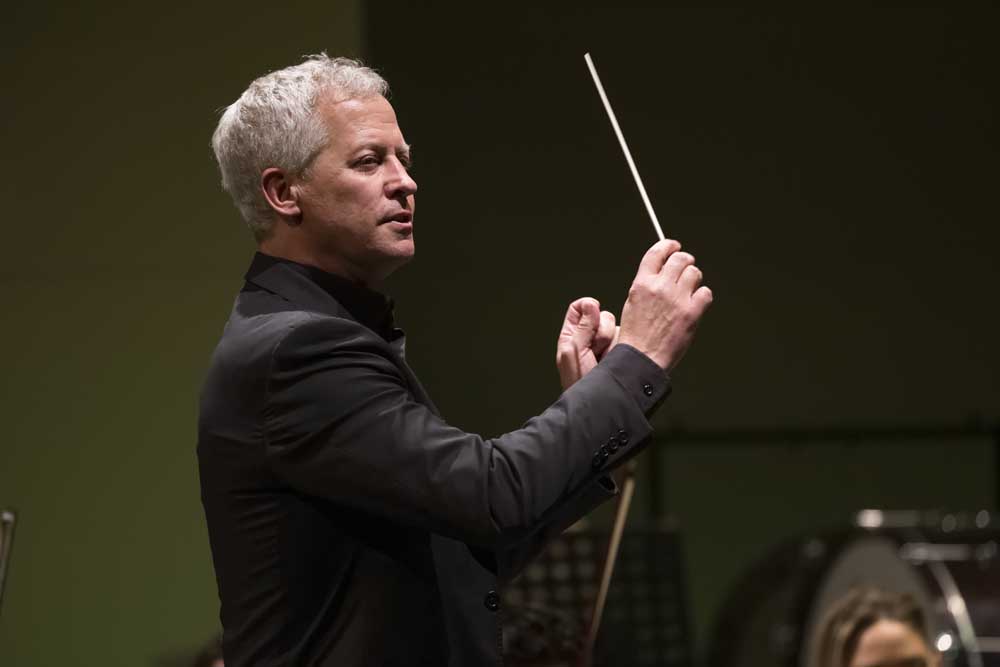Sunriver Music Festival celebrates Bernstein
Published 12:00 am Thursday, August 9, 2018

- George Hanson (Submitted photo)
Like many music organizations around the globe this year, Sunriver Music Festival is celebrating Leonard Bernstein, born 100 years ago this month.
The season’s theme, “Leonard Bernstein at 100: A Celebration!” was the brainchild of Sunriver Music Festival’s conductor, George Hanson.
“He’s been talking about this for three years,” said Pam Beezley, Sunriver Music Festival’s executive director. “He really wanted to make sure that we were part of this wave of symphonies and festivals throughout the world who are celebrating Leonard Bernstein.”
When it comes to recognizing the famed 20th century conductor and composer’s birth, Sunriver Music Festival — which opens Friday at the Tower Theatre in Bend — has an ace up its sleeve: Maestro Hanson was a protege of Bernstein, who died in 1990.
In an essay titled “Lenny and Me: My Years with Leonard Bernstein” on his website, george-hanson.com, the conductor writes, “From the moment I met him in January of 1982 at Indiana University, I sensed that my career path, and even my life course, would be changed by this powerful figure of American culture.”
In a recent phone interview with GO! Magazine, Hanson discussed highlights of the season, as well as his working relationship with Bernstein, which lasted for the last several years of Bernstein’s life.
“He came to Indiana University to compose what turned out to be his last work for stage,” Hanson said, referring to “A Quiet Place” (not to be confused with the sci-fi film released in April). “I worked with him sort of as a student in ’82 and ’83, and then had my first big project as his assistant in 1984-85. I assisted on the recording of the piece we’re describing.”
‘Trouble in Tahiti’
“A Quiet Place,” Hanson explained, is a sequel to Bernstein’s 1951 short opera, “Trouble in Tahiti.” And though “A Quiet Place” isn’t on the program, the orchestra will perform two arias from “Trouble in Tahiti,” along with pieces from “West Side Story,” “On the Town” and “Candide,” during the Aug. 17 Pops Concert at Bend Church of the Nazarene. A number of talented opera singers will be on hand to lend their voices to the evening: Courtney Hoffman, soprano; Hannah Penn, mezzo-soprano; David Gustafson, tenor; and Zachary Lenox, baritone.
“Trouble in Tahiti” was “a kind of obliquely autobiographical work, which has nothing to do with Tahiti,” Hanson said. “Rather, it’s about a married couple that’s in great personal turmoil because they’re not getting along. And of course, this is ironic because he was on his own honeymoon when he wrote it.”
But it wasn’t about his relationship: “The reason this is autobiographical — I’m hardly the first one to notice this, but it’s not really talked about much — Leonard Bernstein is indirectly portraying his own parents.”
“I believe it’s a seminal work in Bernstein’s output that tells us at least as much about him as any of his works,” Hanson said. “In 1982 … he was already talking about how he probably had limited time on this earth to complete — you know, he was not going to get to everything he wanted to. He chose to do a sequel to what obviously he must have thought was an important work for him.”
Hanson continued to work with Bernstein through his remaining years, and they stayed in touch toward the end of Bernstein’s life.
“Even our classical programs have some connection to Maestro Bernstein,” he said. For instance, Classical Concert II on Sunday, which features works by major composers Ludwig van Beethoven, Wolfgang Amadeus Mozart and Robert Schumann.
Bernstein “was very closely associated with the revival of a number of composers, but certainly Robert Schumann,” Hanson said.
Schumann “orchestrated very thickly, so balance is always a problem,” Hanson said. “Bernstein went through the symphonies and edited them heavily with dynamics, and made a real point of performing the symphonies as one of his signature projects.”
Classical Concert III on Wednesday features composer Conni Ellisor’s “Blackberry Winter Dulcimer Concerto,” Jay Ungar’s “Ashokan Farewell,” Felix Mendelssohn’s Symphony No. 3 in A minor, and Aaron Copland’s “Appalachian Spring Suite.” Mountain dulcimer player Stephen Seifert is guest soloist on the concert. Bernstein and Copland met around the time Copland composed “Appalachian Spring Suite.”
In January 1982, shortly after conducting a master class for Bernstein, Hanson sat down with a group of people to watch a PBS broadcast of a series featuring Bernstein.
The series “would cover all of the Beethoven symphonies — and I do hope I’m recalling this correctly,” Hanson said, laughing. “Some of my stories get better the more I tell them.”
According to a 1982 article in the New York Times, he indeed recalls it correctly. The series featured “Ludwig van Beethoven’s nine symphonies as performed by the Vienna Philharmonic Orchestra conducted with characteristic vigor by Mr. Bernstein.”
Hanson noted, as does the article, the title of the show: “It was called, interestingly enough, not ‘Beethoven/Bernstein.’ It was called ‘Bernstein/Beethoven,’ which everybody kind of chuckled at because of course, it was indeed his version of the Beethoven symphony as it were. Very distinct.”
The piece in the broadcast Hanson watched featured Beethoven’s Symphony No. 7, which will be on the program for Classical Concert IV on Aug. 22. The concert will feature the talents of pianist Kenny Broberg, 2017 Van Cliburn silver medalist. A few days prior, on Aug. 19, Broberg will perform the Solo Piano Concert.
You can hear more stories, as well as insights into the concerts ahead, in a new series of short audio recordings by Hanson, titled Maestro Minute at sunrivermusic.org.
“It’s sort of a little trigger of inspiration. In four minutes, I blurt out everything I want to say about a concert,” he said.








